Keep Exploring!
Peg Davis: The Tomato Lady

Peg Davis of Snow Spring Farm in Virginia’s Shenandoah Valley finds happiness and purpose in growing and stewarding heirloom tomatoes, including ‘Peg O’ My Heart’, which she recently donated to Seed Savers Exchange.
Text by Eduardo Fernandez; photos courtesy of Peg Davis
The Tomato Lady
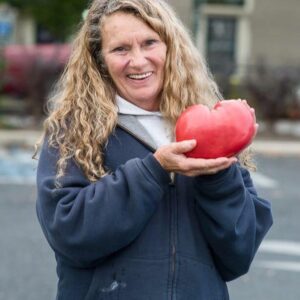
Peg Davis is a dedicated farmer, educator, and poet passionate about growing heirloom tomatoes. Captivated by the stories and histories behind varieties such as the ‘Mortgage Lifter,’ ‘Aunt Lou’s Underground Railroad,’ or ‘Paul Robeson,’ she considers them an invaluable heritage and takes great pride in growing and preserving them.
Her flagship tomato, ‘Peg O’My Heart,’ has been a labor of love for nearly 50 years after a high school student gave her the family’s heirloom seeds. Peg loves collecting seeds from all over the world and is determined to cultivate a tomato variety from every state and country.
As an expert tomato grower, Peg relies on ingenious organic methods to produce a remarkable diversity of flavorful, high-quality tomatoes she’s been selling at the Staunton, Virginia, farmers’ market for three decades. Her tools and techniques include soilless growing mixes, five-gallon buckets, Solo party cups, troughs, and minnows. That’s right, minnows!
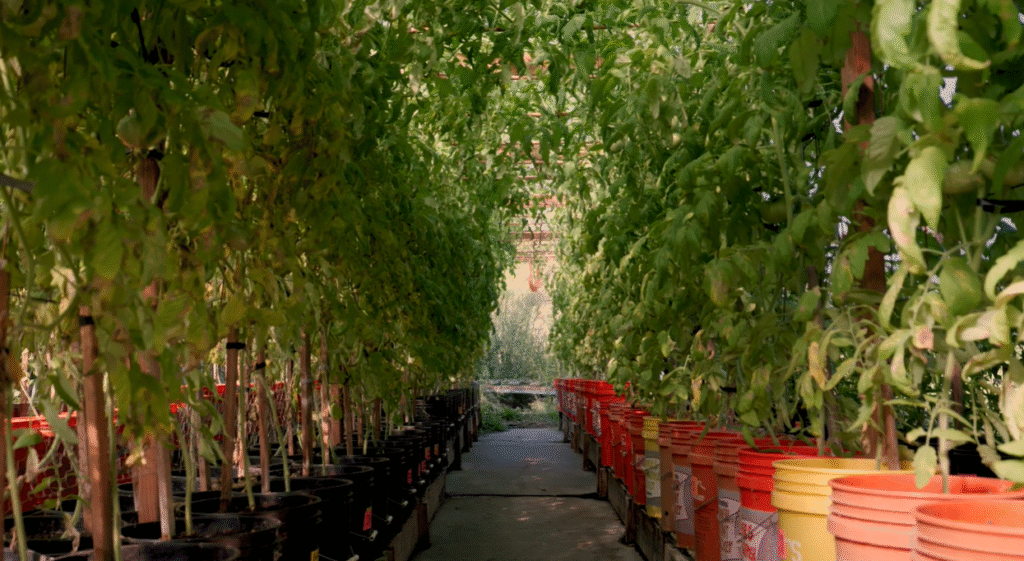
Discovering a Love of Farming
The youngest and only female of Hartwell Davis and Nancy Richards’s five children, Peg Davis was born in Omaha, Nebraska, in 1948. When Peg was 4, the family moved to White Plains, New York, 30 miles north of New York City. Sadly, Peg didn’t thrive in their new home. She was unhealthy and unhappy. Big schools were a challenge for her, and she had to deal with bullying. At home, her brothers and their Boy Scouts activities made her feel overshadowed and useless.
Peg’s parents had close friends who lived on a farm in upstate New York, near the Canadian border. When she turned nine, they sent her there for an entire summer. There, Peg found solace and a profound sense of purpose. “My parents wanted to fatten me up and help me get healthy,” Peg recalls. “My mother put me on a bus in New York City, and I made it to the farm by myself. I loved every minute of it. When I got off the bus, everyone hugged me and said, ‘Oh, you beautiful child.’ I felt so loved. The very next day, they assigned me chores.”
Peg took on meaningful responsibilities and reveled in the sense of importance and belonging that these chores instilled in her. “My responsibilities included watering the chickens, collecting the eggs daily, and mixing the milk for and bottle feeding the baby calf. I also helped clean out the stalls. They taught me how to garden. They taught me how to grow tomatoes. I had never felt happier. It was pure joy. Every year, I returned to the farm for the summer, and each time, my visits got longer and longer until I eventually stayed there.”
Those summers spent on the farm would ultimately shape the course of Peg’s life. After a brief marriage to a Navy pilot during the Vietnam War, Peg found herself a single mother with two children and a 1966 Chevy Nova. “What am I going to do? I have two kids in a car and no money! What am I going to do?” she kept asking a close friend. “You need a red light, green light day, Peg!” her friend replied. “Just…reflect on the times in your life when you were the happiest. Those are your green lights. When you think of moments that brought you unhappiness, those are your red lights. Follow your green lights.”
Peg followed her friend’s advice. Upon realizing her first memory of pure happiness was that first morning on the farm when she was nine, she also immediately realized she wanted to raise her kids on a farm. She wanted them to feel important and needed, with responsibilities, learning about life, death, growing food, and raising animals.
Determined to provide her children with the same nurturing environment she had cherished as a child, Peg made the bold decision to add a bachelor’s degree in agriculture to the bachelor’s degree in ceramics she had already earned from Marietta College in Ohio. Virginia State University, a historically black college in Petersburg, Virginia, gave her a full scholarship and helped her find part-time jobs and a house to live with her children near campus.
After graduation, Peg landed a teaching position in Albemarle County in the Shenandoah Valley, becoming one of the first female agriculture teachers in the state of Virginia.
She would also go on to add more degrees to her résumé. When her kids grew up, Peg pursued a bachelor of arts in English at Mary Baldwin University, and then a master of fine arts in poetry in Northern Vermont. “So here I am at the farmers’ market, telling people, ‘Yep, I have four college degrees, and I’m a street vendor,’ which is something I truly love to do,” she says with a big laugh.
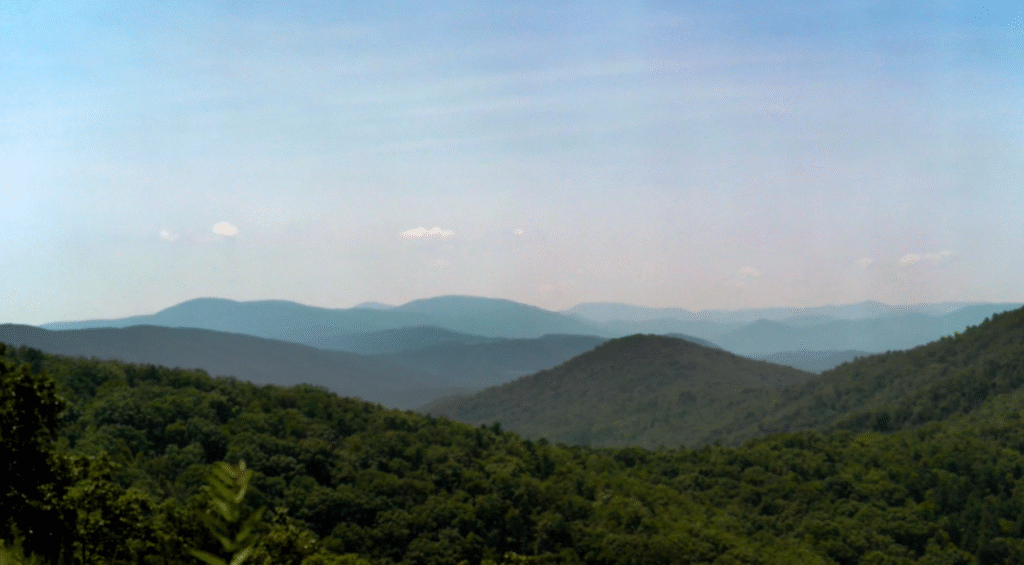
Snow Spring Farm
In the late 1970s, armed with her newfound knowledge and a steady job, Peg and her second husband, George Gerber, a Vietnam War veteran, embarked on a search for a farm to call home. Looking after a friend’s farm in Virginia’s Shenandoah Valley was Peg’s first step into farming. The house had no electricity, running water, or heating. After nearly three years, Peg and George discovered a 155-acre historic property of their own in an isolated area in the foothills of the Allegheny Mountains, just south of Middlebrook, Virginia.
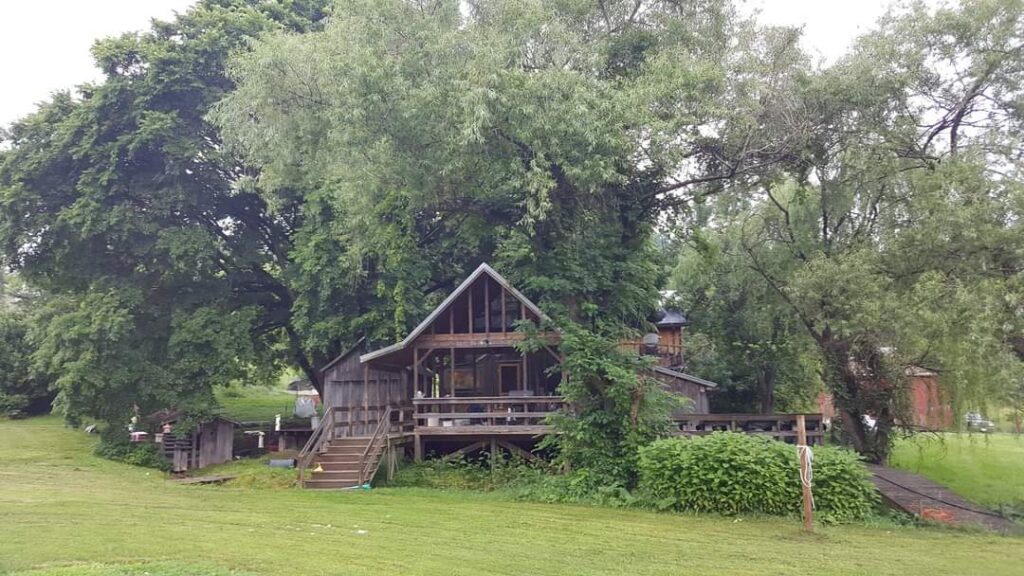
That place, despite its dilapidated 1762 farmhouse, captured Peg’s heart. “When we drove down that lane, I didn’t care what the house was like,” she recounts. “It was falling apart, sheep were living in it, there was a pig, there were birds, there were bats, there were mice—it was really a challenge, but we worked on it and made it home.” This piece of land would become Peg’s “forever” farm: Snow Spring Farm. “It’s called that because the first year we lived here, we had one blizzard after another, and the snow was so deep. We realized the spring by the house was fed by snowmelt. So we called it ‘Snow Spring,’ and the name stuck.”
Although the bank initially considered the $69,500 price of the property to be too high for their budget, Peg was determined to make it work. George’s war-related disabilities limited his capacity to hold a formal job, leading Peg to become the family’s primary breadwinner. With only a $720 monthly paycheck, she managed to pay the $598.98 monthly mortgage and raise her children on the rest. “I raised the kids on that tiny little bit that was left over and what the land could provide,” Peg recalls. “We grew seeds, canned our produce, raised chickens and a milk cow, and made cheese and butter.”
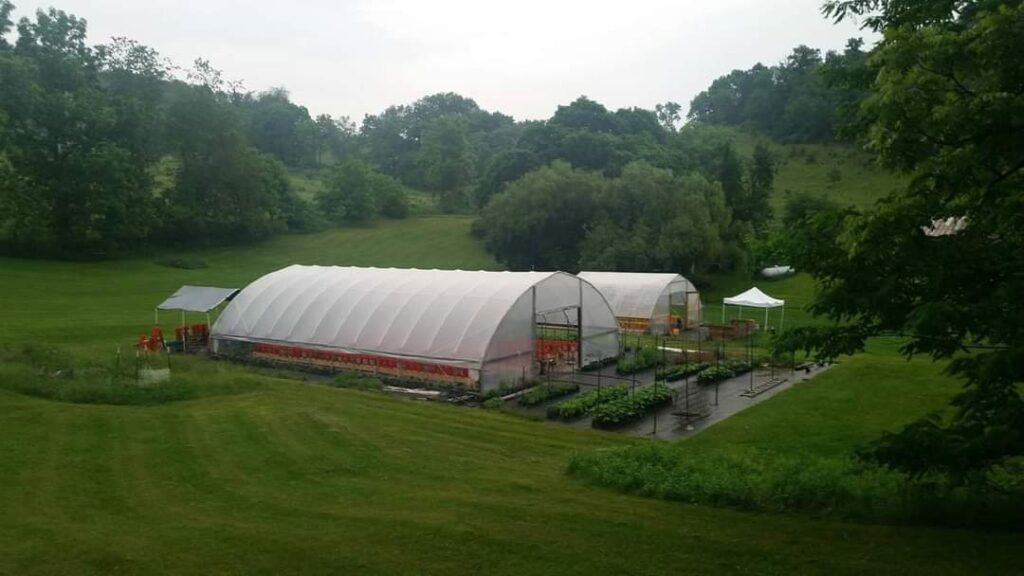
Over the years, Peg and her family poured their hearts into transforming the property, meticulously modeling Snow Spring Farm after the farm of Peg’s childhood. The Jersey cow, the chickens, and the kids having chores were all a deliberate recreation of the life Peg cherished as a young girl.
“We’ve tried everything on this farm,” Peg reflects. “At one point, we raised beef cattle and lost a lot of money. Then we had a flock of 300 sheep, and the losses were even greater. We also attempted hog farming and, surprisingly, made a small profit. Overall, farming is a tough way to earn a living. The most rewarding thing I’ve ever done here is growing food. I truly love it.”
A Passion for Heirloom Tomatoes
An accomplished farmer, Peg cultivates a diverse range of produce. However, heirloom tomatoes are the central focus of her identity and purpose as a farmer. “It’s a tremendous gift when someone shares their family tomato with you,” says Peg. “I’ve been fortunate to receive several. For instance, I have the ‘Amazing Grace’ tomato, which came from a man in Lexington, Virginia. He approached me and said, ‘Peg, I have cancer. My wife passed away, and I have no children. This is the tomato I’ve grown all my life. Will you help keep it going?’ I make sure it keeps going.”
The ‘Peg O’ My Heart’ Tomato
Peg’s flagship tomato is ‘Peg O’ My Heart.’ “Two of our hoop houses are exclusively dedicated to them, with a yearly yield of over 4,000 pounds,” she says. “I have another hoop house on the other side of the farm where I grow 39 other varieties of heirlooms because I want to provide customers with a selection.”
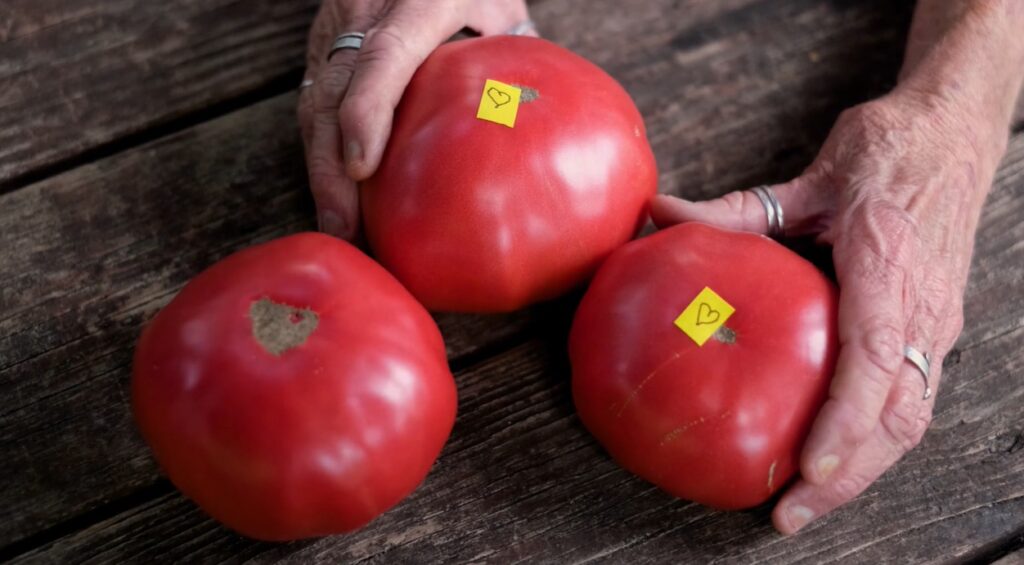
For nearly five decades, Peg has stewarded this variety from seeds she received from one of her ninth-grade agriculture students at Wilson Memorial High School in Fishersville, Virginia. Peg recalls that one day, a girl came to her asking if she would be interested in growing a few seeds she had in a tiny packet. The girl explained the seeds belonged to her family’s tomato, which her deceased grandparents had grown all their lives in Pennsylvania. However, since her parents were not interested in gardening, she didn’t want the variety to disappear.
“There were four seeds left in the packet, and all four of them sprouted,” says Peg. “It was a fabulous tomato, so I started saving and selecting seeds from it. I named it ‘Peg O’My Heart,’ after a popular song my late husband used to sing to me.”
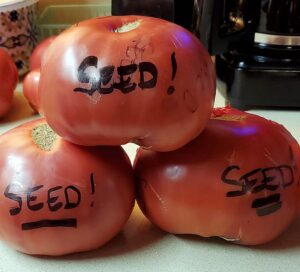
Peg has diligently cultivated and improved the ‘Peg O’ My Heart’ tomato. Over the decades, she’s handpicked the finest specimens to save seeds, continually enhancing this pink-colored slicing tomato’s characteristics. Her efforts have perfected its balanced flavor and texture, along with other desirable traits that distinguish it from other tomato varieties. Today ‘Peg O’My Heart’ is a highly consistent, high-quality tomato that has become the signature crop of her farm.
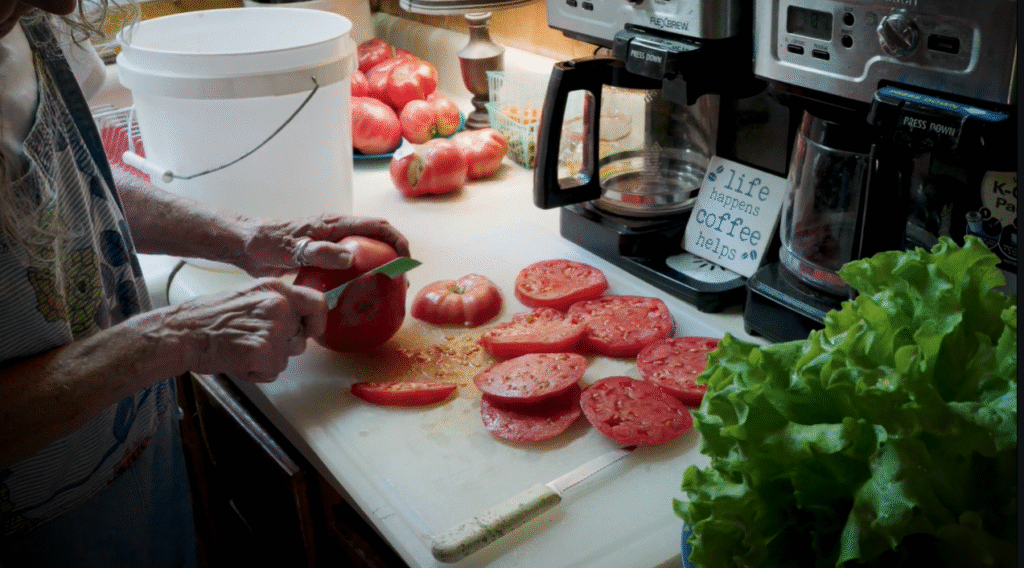
“I focus on selecting specific traits, such as shape, a shallow stem end, and a nicely rounded blossom end without cat-facing,” Peg explains. “Each year, I carefully choose my best tomatoes but don’t eat or sell them. Instead, I save their seeds to grow another generation the following season. With each passing year, they get better and bigger. Now, they typically weigh between one and two pounds and are perfect for a BLT sandwich because they yield nice, even slices.”
Seed Savers Exchange Donation
In 2022, Peg donated the ‘Peg O’ My Heart’ tomato to the Seed Savers Exchange collection. She considers the variety a living legacy and is thrilled it will be preserved and passed to future generations.
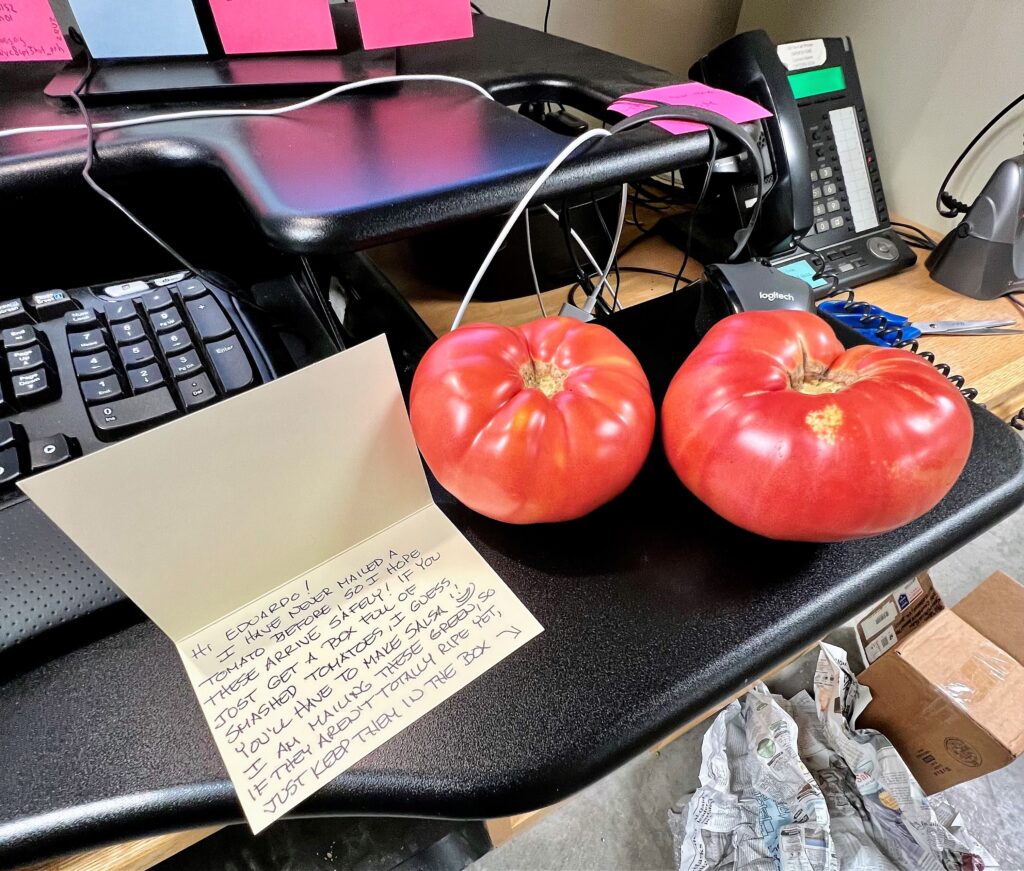
“I am so honored that Seed Savers Exchange accepted ‘Peg O’ My Heart’ into its collection—it’s a dream come true!” says Peg. “I receive numerous seed catalogs every year, but SSE’s has always been my favorite. I love the organization’s mission; their work is amazing and so necessary. But the stories—oh, the stories! For many years, I entertained the idea that perhaps the ‘Peg O’My Heart’ could one day be featured in the Seed Savers Exchange catalog because I believe in that tomato; it’s truly special.”
Seed Savers Exchange currently offers ‘Peg O’ My Heart’ tomato seeds on the Exchange.
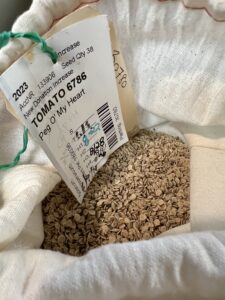
Tomato Awakening
Interestingly, Peg long disliked the taste of tomatoes. Although she loved growing them, she couldn’t tolerate their flavor. That perspective changed one late-summer afternoon, a few days before giving birth to her fifth child, Daniel. “It was one of those idyllic late summer days with the bluest skies and warm, honey sunshine,” Peg recalls. “I was walking through the rows of tomatoes when the most perfectly ripe and beautiful ‘Peg O’ My Heart’ captured my attention and suddenly sparked an intense craving. I said to myself, ‘I think I have to eat that tomato.’ And I did. Right there in the garden, I just tore into it, juice dribbling down my face and shirt.
It was a kind of spiritual experience—truly an awakening of my senses. That was the day that I became passionate about growing this extraordinary tomato. Since then, my mission has been to offer my customers at the market that same delightful tomato experience, that change-your-life moment of ‘this is the best tomato I ever ate.’”
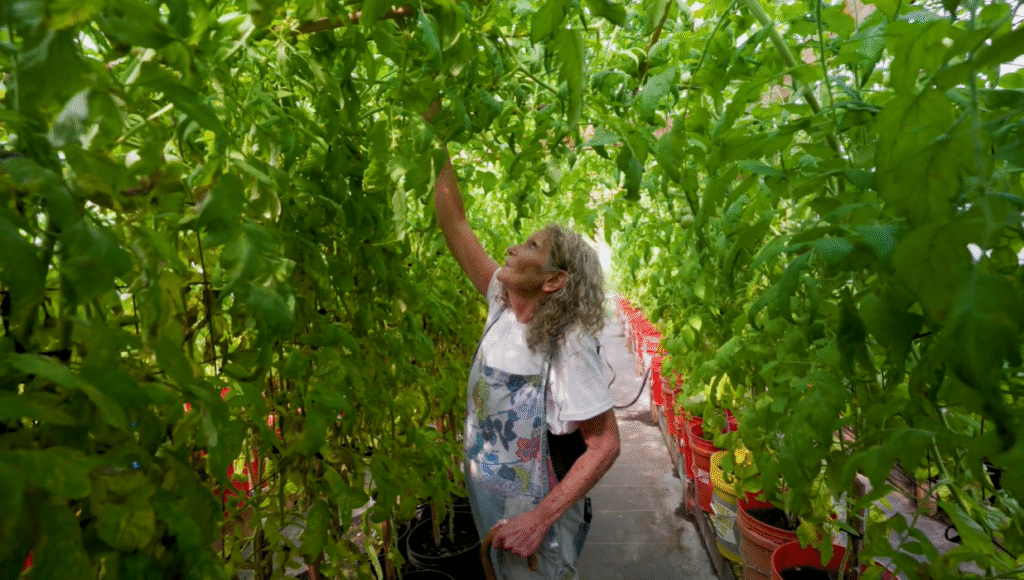
An Aquaponic Growing System
The outstanding feature of Peg’s tomatoes is not only their quality but also the innovative method she uses to grow them. Her unique aquaponics growing system has several key elements that enhance both the quality and yield of her tomatoes. “I became interested in aquaponics about 10 years ago,” says Peg. “My brother Roger kept telling me it was complicated and costly, but my son Daniel found a solution.”
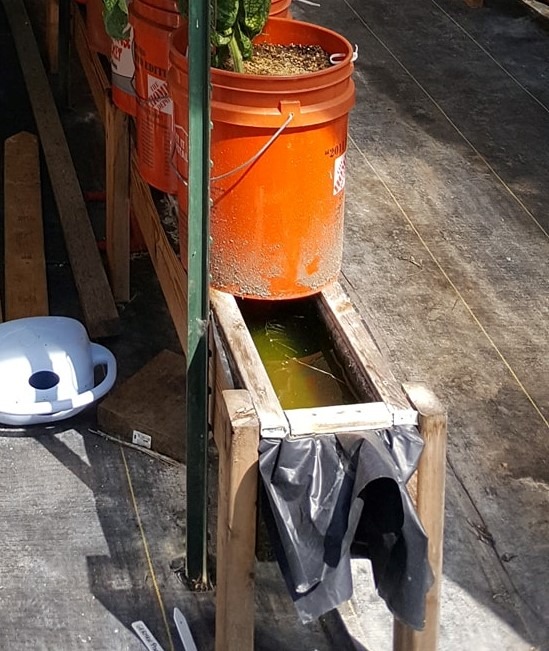
Daniel developed a unique growing system that uses five-gallon buckets, troughs, Solo party cups, soilless growing medium, and minnows, all set up under a high tunnel. Each five-gallon bucket has small holes at the bottom for aeration and a larger hole in the center to accommodate a wicking cup. The buckets are filled with a soilless growing mix and topped with a ring of Espoma organic fertilizer, where the seedlings are planted.
They are positioned above a trough that measures 20 feet long, 8 inches deep, and 8 inches wide, which holds water that houses hundreds of rosy red minnows. The wicking cups extend down into the water, allowing the plant roots to access a constant supply of moisture.

In this system, the minnows help by consuming algae and mosquito larvae, while their waste provides natural fertilizer for the plants. This method makes organic growing more feasible. By not watering the tomato plants from the top, their leaves remain dry, and the high tunnel shields them from rain. This helps keep blight under control. Using a soilless potting mix further helps prevent soil-borne diseases.

“The aquaponics system Daniel developed has been a game-changer,” says Peg. “By incorporating fish into the growing process, we’ve created a closed-loop, semi-self-sustaining ecosystem that provides consistent nutrition for our plants. The troughs provide a steady water supply and allow us to water all the plants at once. This is a huge timesaver compared to my previous method of watering each bucket individually through PVC pipes.”
The Staunton Farmers’ Market
Peg sells her produce at Staunton’s vibrant farmers’ market along with other homemade goods like pies, hot sauces, and an array of dehydrated snacks. People know her for her warm and welcoming character, extensive knowledge, and love and dedication to her craft.

“The market brings me so much joy,” Peg says with a smile. “It’s incredibly satisfying to see so many people who appreciate what you grow. The farmers’ market is a place where people can directly connect with the source of their food and feel good about their choices. More than just a place to buy food, the market serves as a hub for community engagement and education. It’s where I get to share my passion for growing food in an environmentally responsible way, and where people can learn about the origins of their food, the seasonality of crops, heirloom varieties, and the importance of supporting local agriculture.”
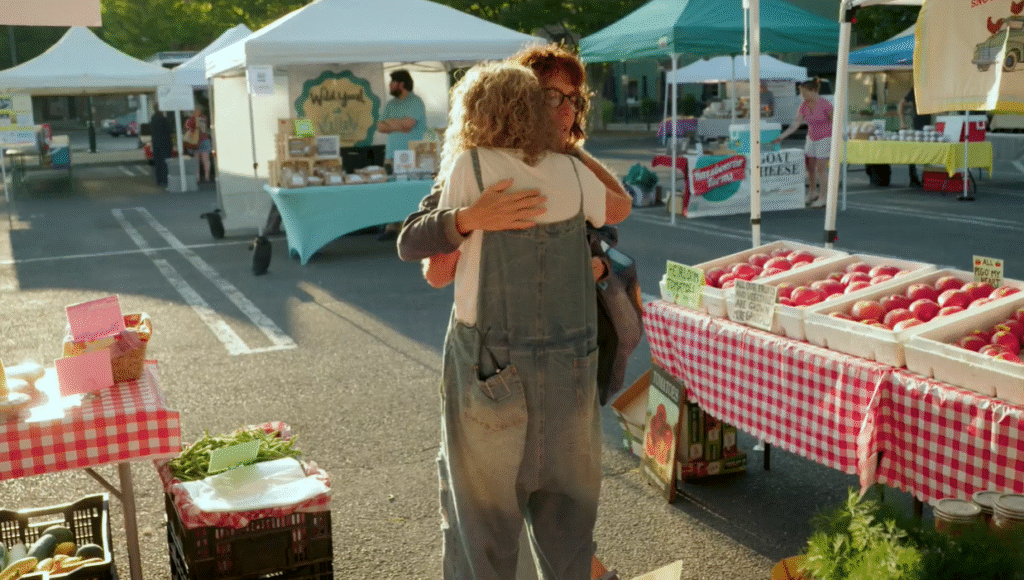
For Peg, her customers are not just buyers; they are partners in her mission. She has become a beacon of community, a trusted source of nourishment, and a wellspring of knowledge. Her role goes far beyond that of a typical farmer—she is a storyteller, a confidante, and a cherished member of the community.
Peg’s life ethos will continue to inspire those she has touched, reminding us of the profound impact that one person can have on the world around them.
Eduardo Fernandez is assistant seed historian at Seed Savers Exchange.
Originally published in 2024 in The Heritage Farm Companion, Volume 13 Issue 4. The Heritage Farm Companion is a membership publication of Seed Savers Exchange.
Peg Of My Heart Documentary
Peg Of My Heart documentary premieres in Decorah, Iowa
Peg of My Heart, a 42-minute documentary featuring Peg Davis, premiered in September 2024 at an event hosted by Luther College’s Center for Ethics and Public Engagement and Campus Programming in Decorah, Iowa.
The film is the result of a collaboration between Seed Savers Exchange and La Casa Post, a production and post-production company based in Philadelphia. The documentary, which serves as a potential pilot for a series that aims to showcase remarkable farmers and gardeners across the United States, was also selected for both the 2025 Oneota Film Festival and the 2025 Organic Seed Growers Conference.
In 2022, Peg Davis of Snow Spring Farm in the Shenandoah Valley of Virginia contacted SSE to express interest in donating the ‘Peg O’My Heart’ tomato for preservation in the SSE collection. Eduardo Fernandez, assistant seed historian, guided her through the intricate process of donating a new variety.
Peg’s compelling and multi-faceted story captivated Fernandez, inspiring him to consider putting it on film. This was a challenging idea, especially given the financial constraints of a nonprofit organization like SSE.
Fernandez shared Peg’s story and the documentary concept with his lifelong friend, Bernardo Morillo, a cinematographer and the owner of La Casa Post. Although Fernandez warned Morillo about the extremely tight budget, Morillo—a seasoned documentarist—recognized the story’s potential and eagerly joined the project. The two had previously collaborated in the late 1990s on the documentary Africa Mia, which focused on Afro-descendant single mothers in the Ecuadorian Sierra.
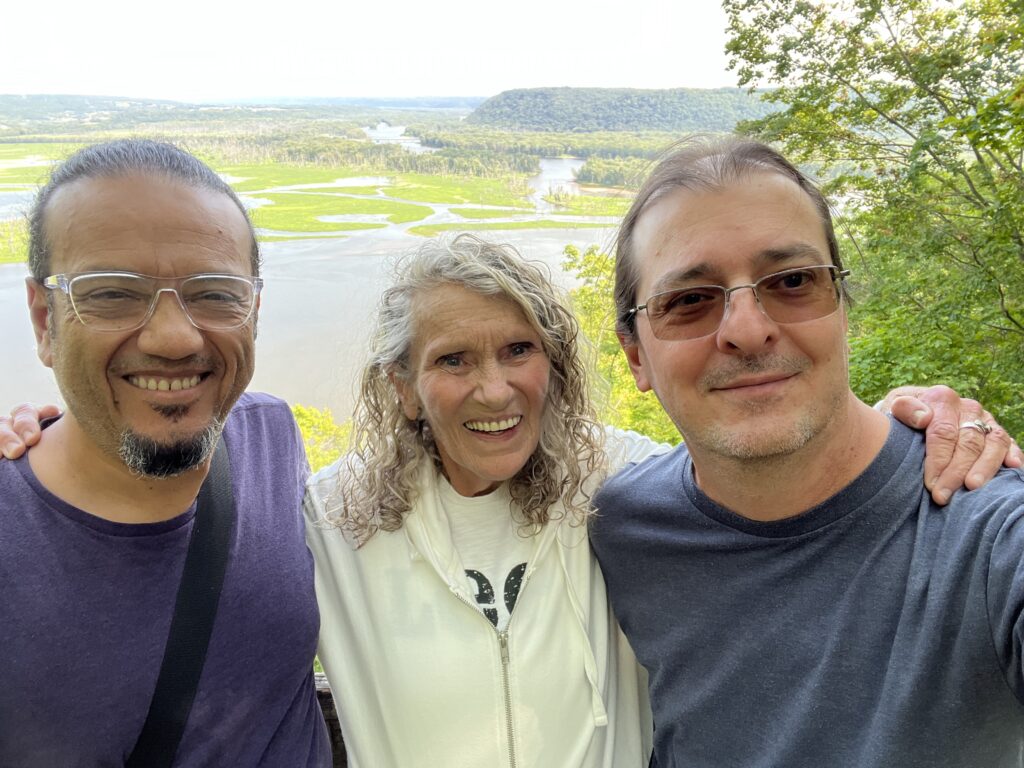
Fernandez and Morillo took an exploratory trip to Snow Spring Farm in August 2023 to meet Davis and conduct an oral history interview, recording both audio and video for SSE’s historical records and as source material for a future Heritage Farm Companion article. They also planned to capture additional footage at Snow Spring and Staunton’s farmers market to create a 2-3 minute reel to support a grant proposal aimed at securing funds for a full-length feature documentary in 2024.
Morillo generously volunteered his state-of-the-art filming equipment and expertise for this project at no cost. Jose Duarte, an associate of Morillo, joined the duo and assisted with the sound. In just three days, the team captured Peg Davis’s oral history and gathered enough footage to create not just a short reel, but a complete feature-length documentary. Morillo worked his magic in post-production, editing a piece that portrays Peg’s story and highlights the essential role of small-scale sustainable agriculture in preserving cultural heritage, strengthening communities, and enhancing individual and collective well-being.
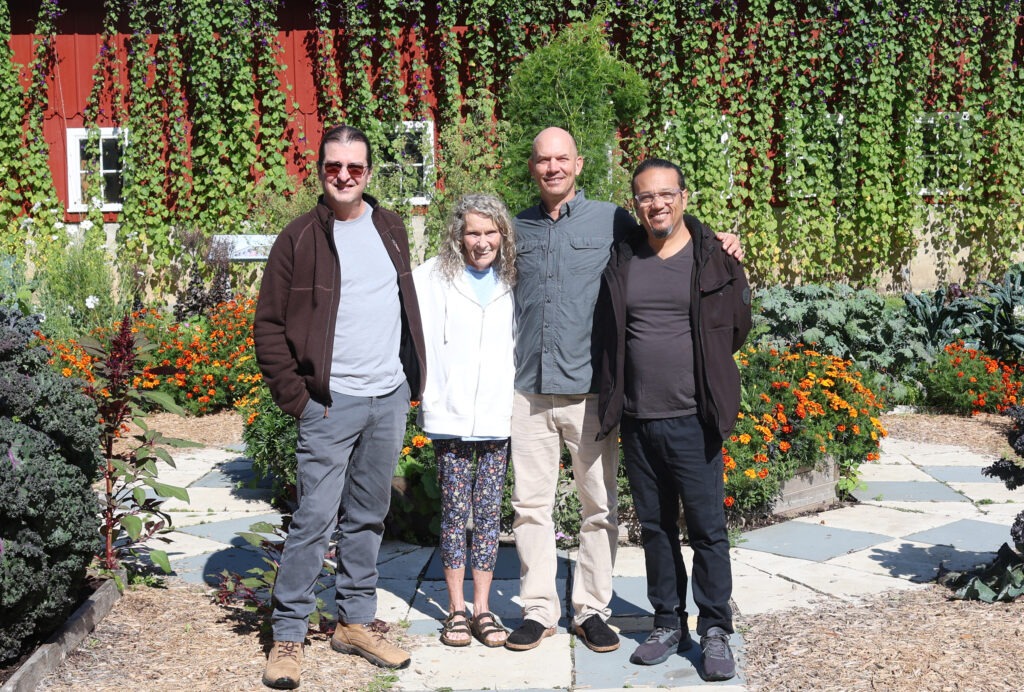
The premiere, sponsored by Luther College, featured the documentary’s director and its protagonist. While in Decorah, Davis and Morillo also met with select Luther faculty and students at various venues and enjoyed a tour of Seed Savers Exchange’s Heritage Farm, where they met with several staff members. Davis capped off her visit by meeting with a group of local women farmers and spending a morning at the Decorah farmers market.
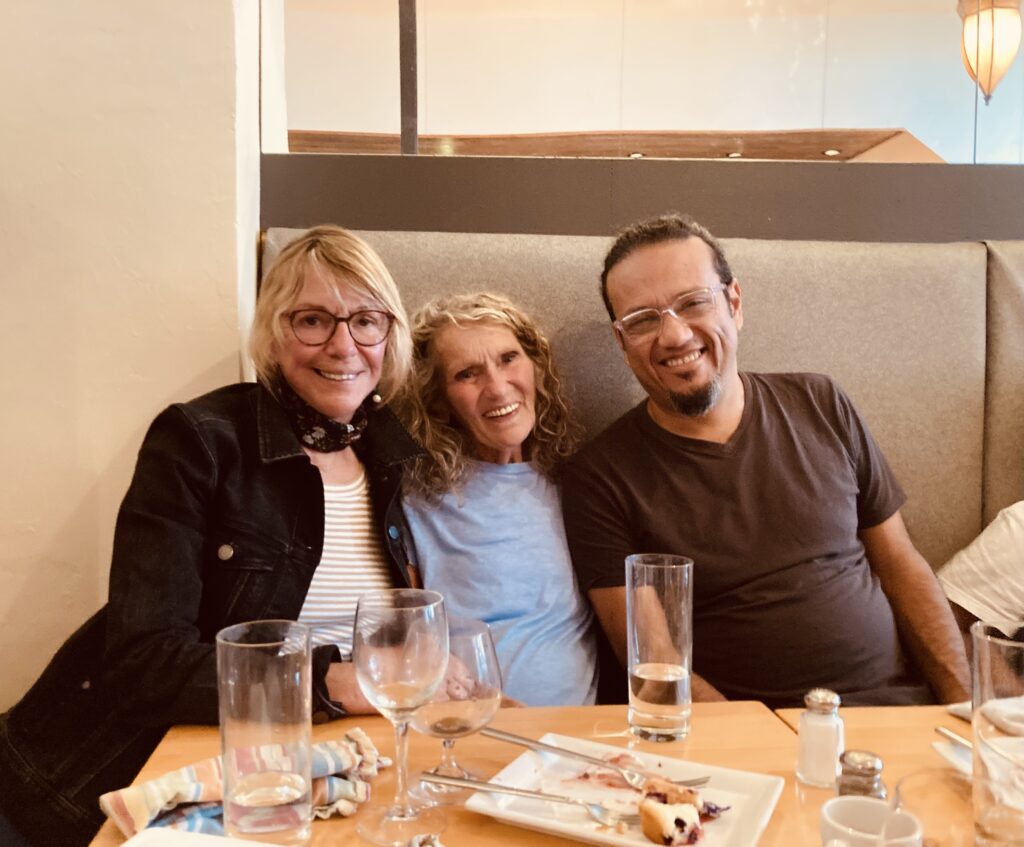
Upcoming Peg Of My Heart Documentary Screening
Peg Of My Heart will be screened Friday, August 8, 2025, at 8:30 PM CT during Seed Savers Exchange’s 50th Anniversary Celebration and Conference. Peg Davis will also be leading a workshop about her hydroponic growing system at the conference.
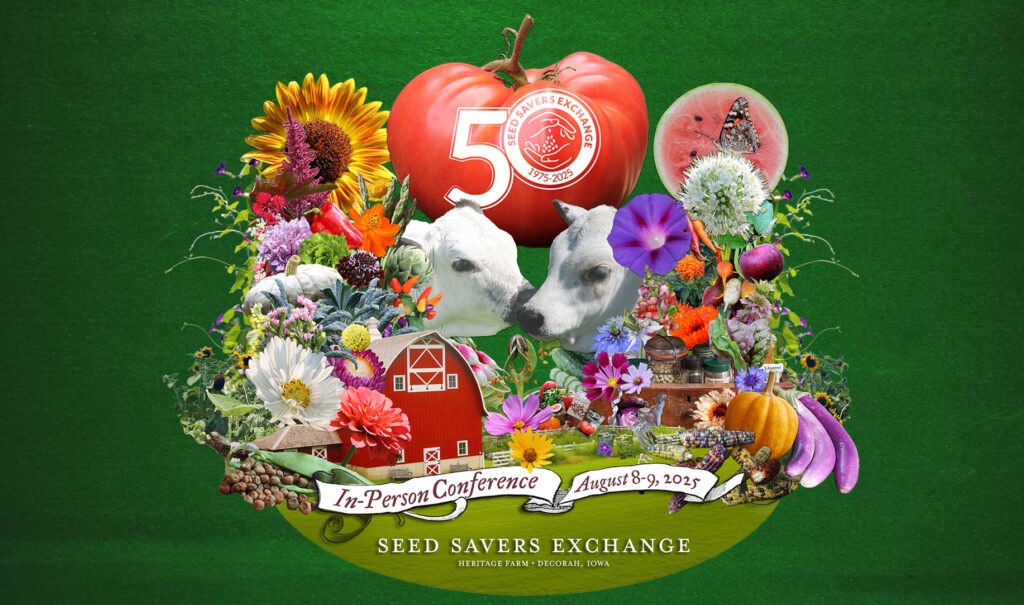
50th Anniversary Celebration and Conference
To commemorate the Seed Savers Exchange network—and all that it has accomplished since 1975—SSE will host a celebration and in-person conference on August 8-9, 2025, at its Heritage Farm headquarters outside Decorah, Iowa. The event will feature speakers, farm and garden tours, workshops, demonstrations, seed swaps, and live music. Learn more about the 50th Anniversary event here.
Registration is open! Register today for the whole weekend speakers, workshops, tours, and entertainment, or choose from individual day passes Friday or Saturday.
Grow the ‘Peg O’ My Heart’ Tomato
While SSE doesn’t currently offer ‘Peg O’ My Heart’ tomato seeds in the commercial catalog, the seeds are available by request from the Exchange, our gardener-to-gardener seed swap. Browse the Exchange.
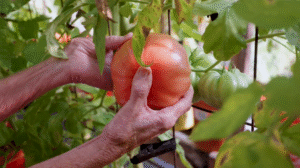
How to Grow Tomato Seeds
- Start tomato seeds indoors 1/4-inch deep 4-6 weeks before the last frost date.
- Transplant tray-grown seedlings into 3-inch pots when 2 to 3 true leaves have formed.
- Transplant outdoors in a sunny spot after the soil has warmed (at least 50 degrees) and the danger of frost has passed.
- Space tomato plants 24-48 inches apart in rows at least 36 inches apart.
- Use trellises or cages to provide vertical support for tomato plants.
- Keep tomato plants moist, but not waterlogged.
- Harvest tomatoes when they are firm to the touch but still seem to give a little. Ripe tomatoes should easily come off the vine.
For more information, visit our Tomato Growing and Seed-Saving Guide.